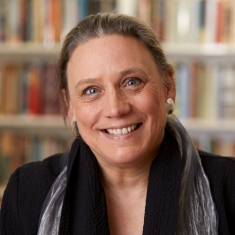Laurie Patton
Honorary Degree Recipient: Doctor of Letters

Rutgers is proud to bestow upon Laurie L. Patton an honorary doctor of letters degree. Patton is the president of the American Academy of Arts & Sciences, a position she started in January 2025. She is a scholar, poet, translator and leader who has spent a life in letters, and in service to higher education.
Prior to the Academy, Patton served as the president of Middlebury College—the first woman to lead the institution in its 224-year history. Her leadership at Middlebury brought a signature initiative on conflict transformation, where skills in addressing conflict are understood as a necessary part of a twenty-first century education. As a result of her environmental leadership, Middlebury is now well on its way toward its goal of being the first campus of its kind to be 100% powered by renewable energy in 2028, after becoming carbon neutral in 2016. Patton also introduced new arts, sciences, and residential learning programs and raised $500 million in a record-breaking comprehensive campaign.
Previously, Patton served as dean of Duke University’s Trinity College of Arts and Sciences and the Durden Professor of Religion. At Duke, she oversaw 36 academic departments and programs in arts and sciences for the school, which awards 80 percent of Duke’s bachelor degrees. Patton also oversaw Trinity’s $435 million commitment to the “Duke Forward” campaign.
From 1996 to 2011, Patton served on the faculty and administration at Emory University, where she was the Charles Howard Candler Professor of Religions and the inaugural director of Emory’s Center for Faculty Development and Excellence in the Office of the Provost. While at Emory, Patton served as chair of the Religion Department from 2000 to 2007. Patton began her career at Bard College, where she was assistant professor of Asian religions from 1991 to 1996.
Patton is an authority on South Asian history, culture, and religion, and on religion and the public sphere. She is the author or editor of eleven books and more than seventy articles in the field, and has translated the classical Sanskrit text The Bhagavad Gita for Penguin Classics. She has also published three books of poetry, focusing on themes of Indian mythology, Biblical narrative, and the architectural imagination. Patton has lectured widely on interfaith issues and religion and public life, and she has consulted with White House offices on faith-based initiatives and civic engagement. She has held Fulbright Fellowships in Israel and India and visiting appointments at the University of Tel Aviv, Hebrew University, and Deccan College (India).
Patton earned her BA from Harvard University in 1983 and her PhD from the University of Chicago in 1991. From 2008 to 2011, she served as president of the American Society for the Study of Religion. In 2019, Patton became president of the American Academy of Religion, a national scholarly society of over 8000 members. She was elected to the American Academy of Arts & Sciences in 2018 in two categories, philosophy/religion and educational leadership. Since becoming President, Patton has been focusing the Academy’s initiatives on building and maintaining democracy through the cultivation of thought leadership.